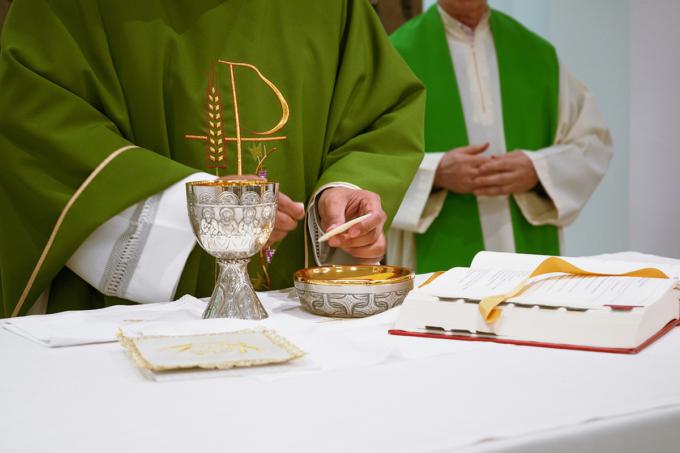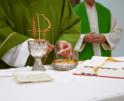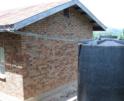
Faith

The prayers emphasize the reconciliation that God initiated and perfected in Christ, and which is continued in the ministry of the church.

O'Grady
This final article on Eucharistic Prayers considers two sets of Eucharistic Prayers that can be used in very specific circumstances.
Eucharistic Prayers for Reconciliation I and II
These two prayers were composed along with the three Masses with Children and sent to the bishops in 1974. They were approved conditionally but proved to be so popular that they were added to the Roman Missal; Latin first, then, following the usual translation process, in the various vernaculars.
The Eucharistic Prayers for Reconciliation got an added boost or incentive for use during the Holy Year of 1975, and in 1983, when Pope St. John Paul II issued a document on reconciliation and had decreed an Extraordinary Holy Year.
The prayers emphasize the reconciliation that God initiated and perfected in Christ, and which is continued in the ministry of the church. They emphasize that this remains a goal to be obtained, one that these prayers direct our attention to and remind us of the need for reconciliation on many levels: the individual with God and with others, communities, peoples, and nations -- all of them with God, and then between and among each other.
The prayers follow the usual outline of Eucharistic Prayers in the Roman Missal. Each has a preferred preface to be used with the respective prayer. However, there is also the possibility to use other prefaces that are "penitential" in nature, for example, the four prefaces for the Lenten season. These prayers are especially appropriate for the Lenten season and could be used even on a Lenten Sunday that does not have a proper preface. And they could be prayed on any weekday of Lent, except those where there might be a solemnity (Annunciation and St. Joseph) or a feast. For example, here in Boston, March 17 is a feast across the entire archdiocese and a solemnity in the parishes bearing St. Patrick's name.
They could also be used at other times throughout the year, when one of the Masses for Various Needs at the back of the Missal could be offered, e.g. for peace, for reconciliation.
These prayers provide another way to emphasize an important aspect of God's action in our prayers; and to invite us to pray for the reconciliation of all.
Eucharistic Prayers I, II, and III for Masses with Children
The three Eucharistic Prayers for Masses with Children were written in French and German and were initially intended to be used progressively for children at varying pre-teen ages. The first two composed in French were suggested for two age groups, what we would today call kindergarten to grade two; and the next, grade three to four, and the third from Germany for grades five to six. Once the prayers were translated into Latin and then to vernaculars, that incremental or progression concept disappeared and any of the three could be used at any Mass with Children.
These three prayers have the most limitations on their use.
First, they admit no variation, meaning that each entire prayer must be used as it is printed -- no flipping pages needed! On the other hand, the prayers are not to be found in the Roman Missal. You must use a separate booklet that contains their texts, an introduction and explanation, and the rules in red (known as rubrics) for their use. There is a strong suggestion that there be no concelebrants at these Masses to lessen confusion among the children. Oddly, the prayers are divided into sections with the designation "concelebrant."
Next, the majority of the assembly must be children, i.e. pre-teens. Further, the children need to be prepared by regular attendance at such Masses as it requires "extra participation." There are more responses throughout the Eucharistic Prayers, preferably to be sung. Another issue is that, at some of those Masses, there would be children who have not received First Holy Communion and so cannot "fully participate." Thus, caution must be used, especially in the children's preparation.
It is unlikely that this prayer could be used at parish Sunday Masses even if there were a group or groups of children, since the majority would likely be teens, and young adults or older adults. Likewise, when there are proper prefaces for seasons such as Easter, this prayer cannot be used.
Parishes that have Catholic schools with students grades one through six, and regularly have children at Masses, might use this prayer at those Masses. Again, preparation of the children and involving their parents in this is vitally important.
Comments
Comments Policy
Recent articles in the Faith & Family section
-
Eucharistic Prayers for Reconciliation and for Masses with ChildrenFather Robert M. O'Grady
-
Mainstay of Seminarians in the Missions: The Society of St. Peter ApostleMaureen Crowley Heil
-
Arise!Scott Hahn
-
The opportunity of summer: Build and repair relationshipsDr. R. Jared Staudt
-
Why does the Catholic Church oppose contraception?Jenna Marie Cooper


















